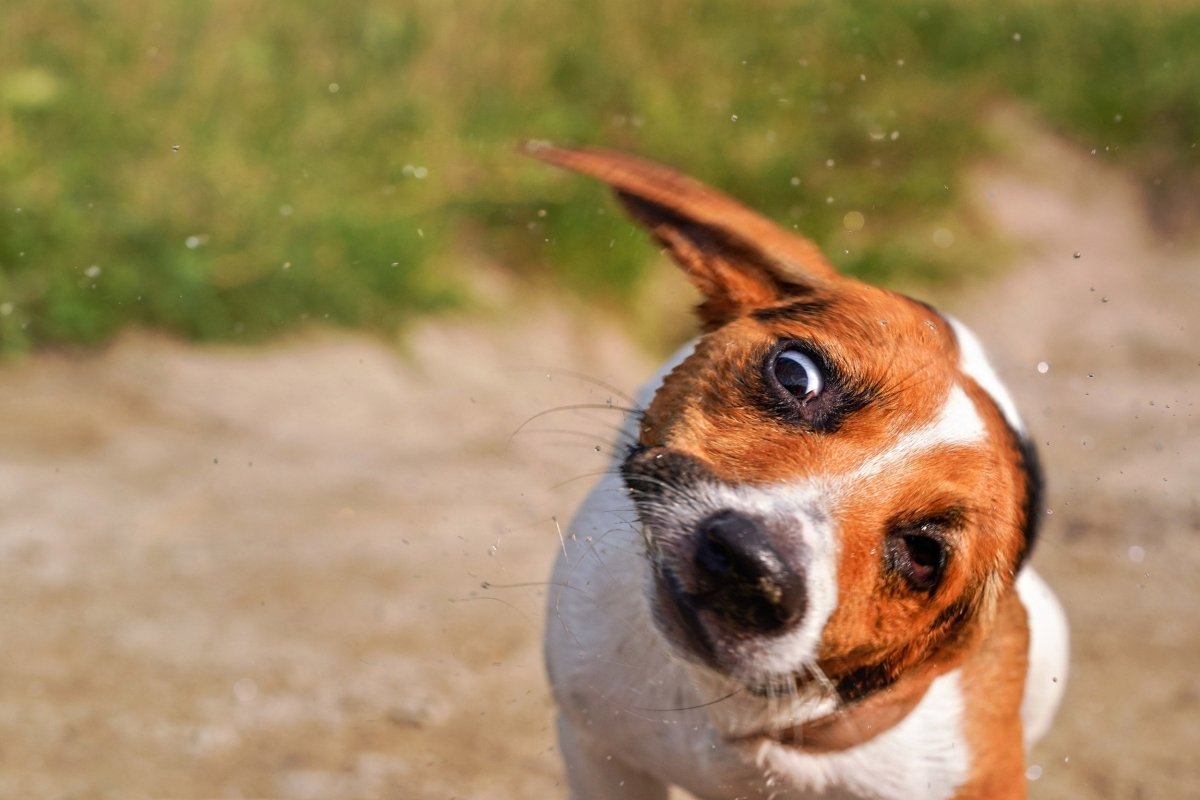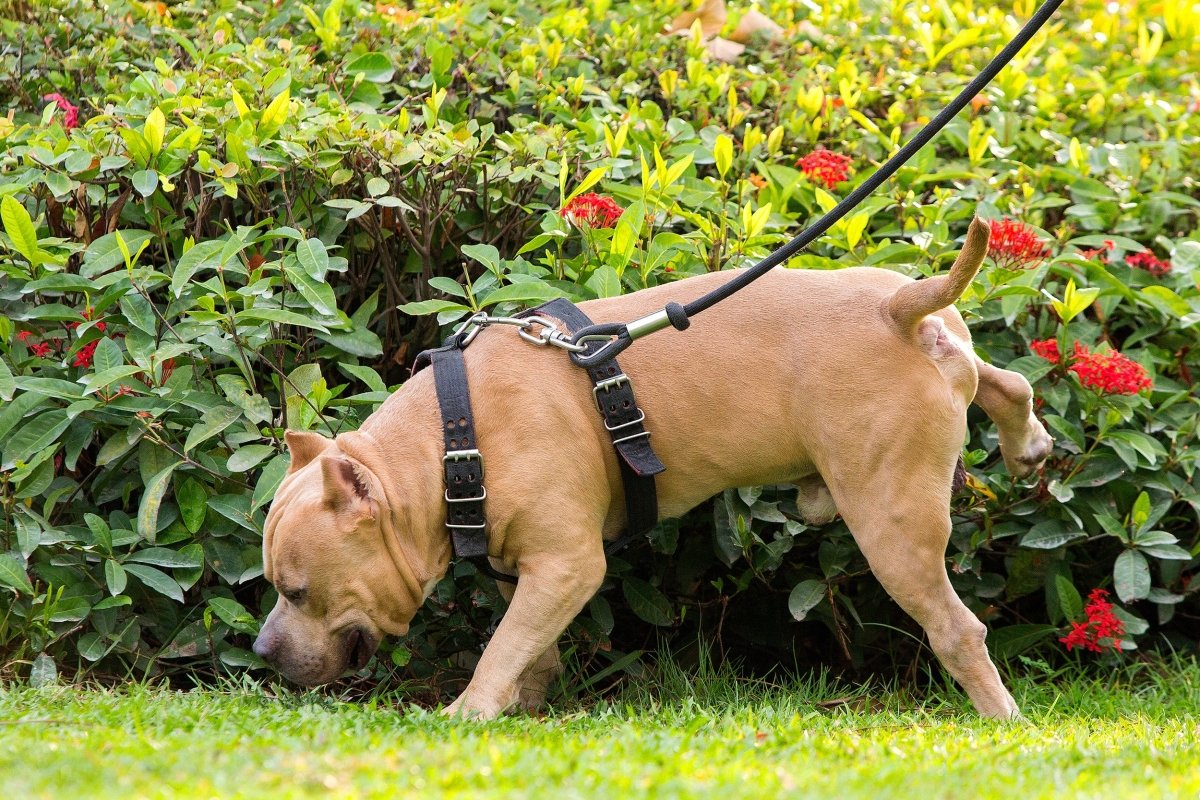A dog normally shakes its head several times a day; after getting up, rolling in the dirt, running through tall grass or getting wet in a rain shower. This behavior is completely normal and even helpful, as it keeps your four-legged friend clean and protects him from catching a cold.
However, if your dog shakes its head very frequently without being able to associate it with certain situations, it may be due to a pathological cause or even parasites.
Is your dog shaking its head and keeping the rest of its body still? Then you should continue to keep a close eye on your pet and take it to the vet soon. If it is a disease, it should be treated as quickly as possible to protect your pet's sensitive ear canals and prevent ear pain in dogs. AniForte explains exactly what can be behind this behavior and how you can get your dog's head shaking under control.
Dog shaking its head: distinguishing harmless triggers from illnesses
Your dog shakes its head and you will quickly be able to recognize and distinguish for yourself whether this is normal behaviour or whether your pet may be suffering from an earache. Dogs do not normally shake their heads when they are at rest; however, if your dog is lying down and keeps lifting its head to shake it, this is a very clear sign that something is wrong.
There is also a clear difference between the types of shaking. A dog that shakes its head to remove dirt from its coat or to dry itself usually uses its whole body and shows full commitment. If your dog shakes his head constantly, but only briefly, he probably has an earache. The following accompanying symptoms may also occur if there is a serious cause behind your dog's head shaking:
- Dog shakes head with painful whimpering
- Scratching of the head and ears
- Dog shakes head with tilted posture
- Rubbing over the floor / against objects
- Dirty / very hairy ears
- Unwillingness to move / dog shakes head and withdraws
Dog shakes head - most common cause: ear infections
If your dog shakes its head, scratches itself or shows pain in the head area, the most common cause is an inflammation of the ears, known as otitis. It has various causes, but occurs particularly often in long-haired breeds with floppy ears. On the one hand, they usually have very hairy auricles and, on the other, the ventilation of the ear canals is severely restricted; the perfect environment for dirt, bacteria, parasites etc. Your dog is shaking his head? Then otitis could be a plausible explanation.
Dog shaking its head: causes of ear infections in dogs
The possible causes of an ear infection and "the dog shakes its head" are varied and should always be determined by a vet, as the treatments differ greatly from one another. Triggers range from mites, bacteria and fungi to injuries caused by foreign bodies, food intolerance or anatomical causes such as a natural narrowing of the ear canal.
In any case, otitis must be treated as quickly as possible in order to avoid complications and secondary infections such as meningitis and chronic ear pain in dogs - home remedies or supplements for dogs are not sufficient on their own, but can be administered in consultation with the vet.
Dog shaking its head: preventing ear infections & other causes
To prevent ear infections and worse, regular eye, ear and paw care is extremely important for dogs! Especially with floppy ears, whose ear canals are heavily overgrown with fur, you should either visit the groomer regularly or do it yourself to carefully pluck out the hair. Hygiene is the top priority here; make sure that the loose hair does not fall into your dog's ear canal.
Some dogs also produce a lot of earwax, which is supposed to protect the ears, just like humans. However, a lot of earwax can also contribute to the ears becoming blocked and bacteria can accumulate more easily; you can prevent this with our AniForte ear cleaning pads. Your dog shakes its head and you can check for and remove any dirt. This is a good way to prevent your dog from shaking its head.
Dog shakes ears: Supporting the treatment of an ear infection naturally
If your dog is shaking its ears and you notice typical symptoms of an ear infection, you should visit the vet as soon as possible. To avoid aggravation, it is no longer advisable to do anything yourself at this point - this could carry bacteria, yeast etc. even further into the ear canal, cause severe ear pain in the dog and make treatment by the vet even more difficult. What you can always do to support your dog's health is to feed them healthy and natural dog food.
Once the vet has found the cause of the inflammation using an otoscope, your dog will usually be treated with anti-inflammatory medication. Antibiotics or antifungals can also be used to treat bacterial inflammation. If your dog is in pain, he will also be given painkillers and a clinical ear cleaning.
Dog shaking its head due to foreign bodies in the ear canal
In addition to an ear infection, there are also other possible causes of your dog shaking its head. Foreign bodies such as awns, for example, which often get caught in the hair of the ear canal or even in your dog's paws when playing in tall grass, are quite common. These annoying little plant particles are not only unpleasant and cause your dog to shake its head, they can also cause serious injuries to the ear. The deeper the awn sits, the more dangerous it can be.
Caution should be exercised here too: If you can see the lump, can reach it easily and your dog is keeping still, you can remove it yourself very carefully with blunt tweezers. Otherwise, you should see a vet as soon as possible for safe, hygienic removal. Even if you are not sure whether or which foreign body is in your dog's ear, a visit to the vet is unavoidable; in the event of pain, bleeding or other worrying symptoms, the veterinary emergency service is the right place to go.
Dog shakes its head: parasites cause itching
As parasites often spread to young or immunocompromised dogs, strengthening the immune system and a healthy diet are extremely important to counteract parasitic infestations on and in your dog's ears in advance. In consultation with your vet, you can use supplements to boost your dog' s immune system.
However, once your dog is infested with ear mites, these infectious and itchy pests should also be treated quickly. You can often recognize ear mites by their brown, crumbly and foul-smelling ear discharge. The parasites also bite your dog, which often leads to red spots and inflammation. To get rid of ear mites, you should consult a vet and keep other dogs away from your furry friend during this time to avoid transmission.
In consultation with the vet, we recommend that you first carefully clean the affected areas with a special ear cleaner in the event of an ear mite infestation. The natural ear mite oil from Aniforte® can then be applied selectively. This gentle oil combats the parasites thoroughly without irritating your dog's head.
Both the coat and the surrounding area should be cleaned regularly with an effective mite STOP spray, as mites can survive in fallen skin flakes for up to 18 days. This is a further risk of infection for both animals and humans.
Over the next few weeks, good ear hygiene and use of the products will continue to be important in order to get rid of the mites permanently and minimize the risk of re-infestation.
Many customers report that the combined use of the two products can reliably eliminate the mites. The natural power of plant and essential oils lets your pet breathe a sigh of relief.
Would you like to quickly and gently drive out the annoying parasites from your faithful companion? Then try our effective mite STOP spray and ear mite oil from Aniforte®.
Do you have any questions about "Dog shakes head" or other topics? Please feel free to contact us.


